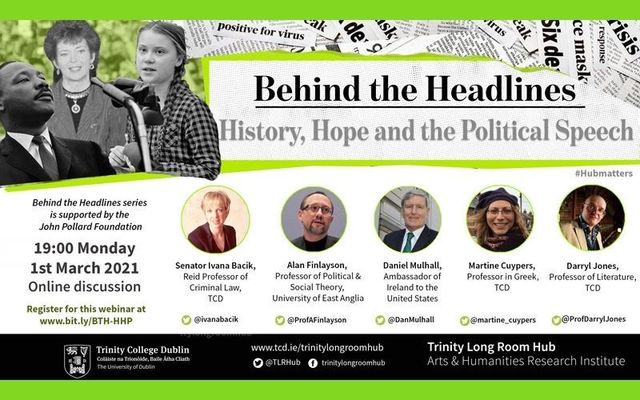Trinity Long Room Hub Arts & Humanities Research Institute presents "Behind the Headlines: History, Hope, and the Political Speech” on Monday, March 1.
You can watch back on TLRH's "History, Hop and the Political Speech" webinar here.
What makes a political speech? From Aristotle to Hannah Arendt, philosophers have seen the arts of rhetoric and oratory as essential to the proper functioning of the public sphere.
Some speeches, like Martin Luther King’s 1963 dream vision or Greta Thunberg’s 2019 ‘How dare you?’ address have defined a generation. Others have embedded lasting images, metaphors, and poetic borrowings – ‘the iron curtain’, ‘rivers of blood’, ‘when hope and history rhyme’ – in the public imagination.
In Ireland, powerful speeches have patterned our history, from Robert Emmet’s 1803 declamation from the dock to Mary Robinson’s 1990 presidential acceptance speech, that heralded the women of Ireland for rocking the system instead of rocking the cradle.
How is language shaped to such effect, and how does political oratory play with truth, emotion, and imagination? Can the tradition of the political speech endure in an age of social media sound-bites?
In the March 1 Behind the Headlines live event, which takes place in the dark shadow of the January 6th riots in Washington, we will also ask about the political speech in the context of dictatorship, demagoguery, and the weaponising of words, and ask at what point the art of public persuasion tips over into incitement.
Panelists for Trinity Long Room Hub Arts & Humanities Research Institute's "Behind the Headlines: History, Hope and the Political Speech" event:
Daniel Mulhall, Ambassador of Ireland to the United States
Ambassador Mulhall joined the Department of Foreign Affairs in 1978 and had his early diplomatic assignments in New Delhi, Vienna (OSCE), Brussels (European Union) and Edinburgh where he was Ireland's first Consul General, 1998-2001. From 2009 to 2013, he was Ireland's Ambassador to Germany. Before arriving in Washington, he served as Ireland's Ambassador in London (2013-17). Ambassador Mulhall maintains a keen interest in Irish history and literature. He is the author of A New Day Dawning: A Portrait of Ireland in 1900 (Cork, 1999) and co-editor of The Shaping of Modern Ireland: A Centenary Assessment (Dublin, 2016).
Senator Ivana Bacik, Reid Professor of Criminal Law, Trinity College Dublin
Senator Ivana Bacik, LLB, LLM (Lond), BL, FTCD, is the Reid Professor of Criminal Law, Criminology and Penology at Trinity College Dublin (previously held by Mary Robinson and President Mary McAleese). She is a qualified Barrister, and a Senior Lecturer and Fellow of Trinity College Dublin (elected in 2005). She is a Senator for Dublin University (elected 2007, re-elected 2011 and again 2016). Her research interests include criminal law; criminology; feminist theory of law and equality law.
Alan Finlayson, Professor of Political & Social Theory, The University of East Anglia
Alan Finlayson is a Professor of Political & Social Theory at The University of East Anglia in Norwich. In the last four years, he’s been involved in a number of research projects funded by the UK Arts and Humanities Research Council including ‘The Crisis of Rhetoric’ which brought politicians, journalists, speechwriters, and academics to discuss the quality of political speech in the UK today, and a project on how digital culture and technology is affecting political rhetoric and argument.
Darryl Jones, Professor of Literature, Trinity College Dublin
Professor Jones's major areas of research and supervision have been in Popular Literature, Jane Austen, and Horror. His work tends to focus largely (though not exclusively) on British writing. He is currently writing a monograph entitled Dead London: Representing the Shadow-City in the Nineteenth Century, which examines the way in which London’s various shadows, doubles, underground, and unofficial or abject selves are imagined in Victorian literature and culture.
Martine Cuypers, Professor in Greek, Trinity College Dublin
Dr. Martine Cuypers is Lecturer in Greek at Trinity College Dublin. She holds a Ph.D. from Leiden University and has previously worked as a lecturer and research fellow in Hamburg, Leiden, Groningen, Chicago, and Washington DC. Her research focuses on epic and the Greek literature and culture of the Hellenistic period and Empire.
The Trinity Long Room Hub Behind the Headlines series is supported by the John Pollard Foundation.
Please indicate if you have any access requirements, such as ISL/English interpreting, so that we can facilitate you in attending this event. Contact: [email protected].



